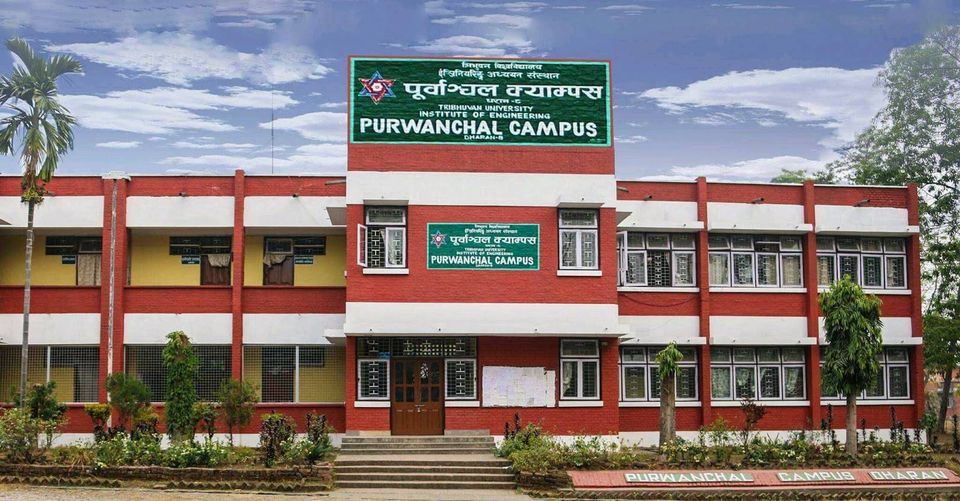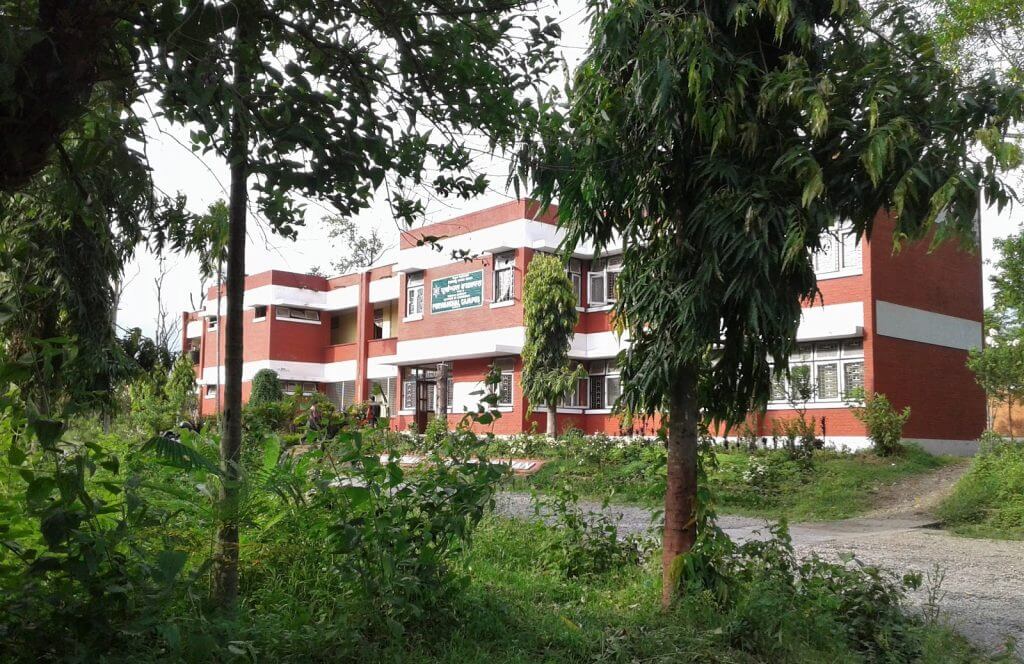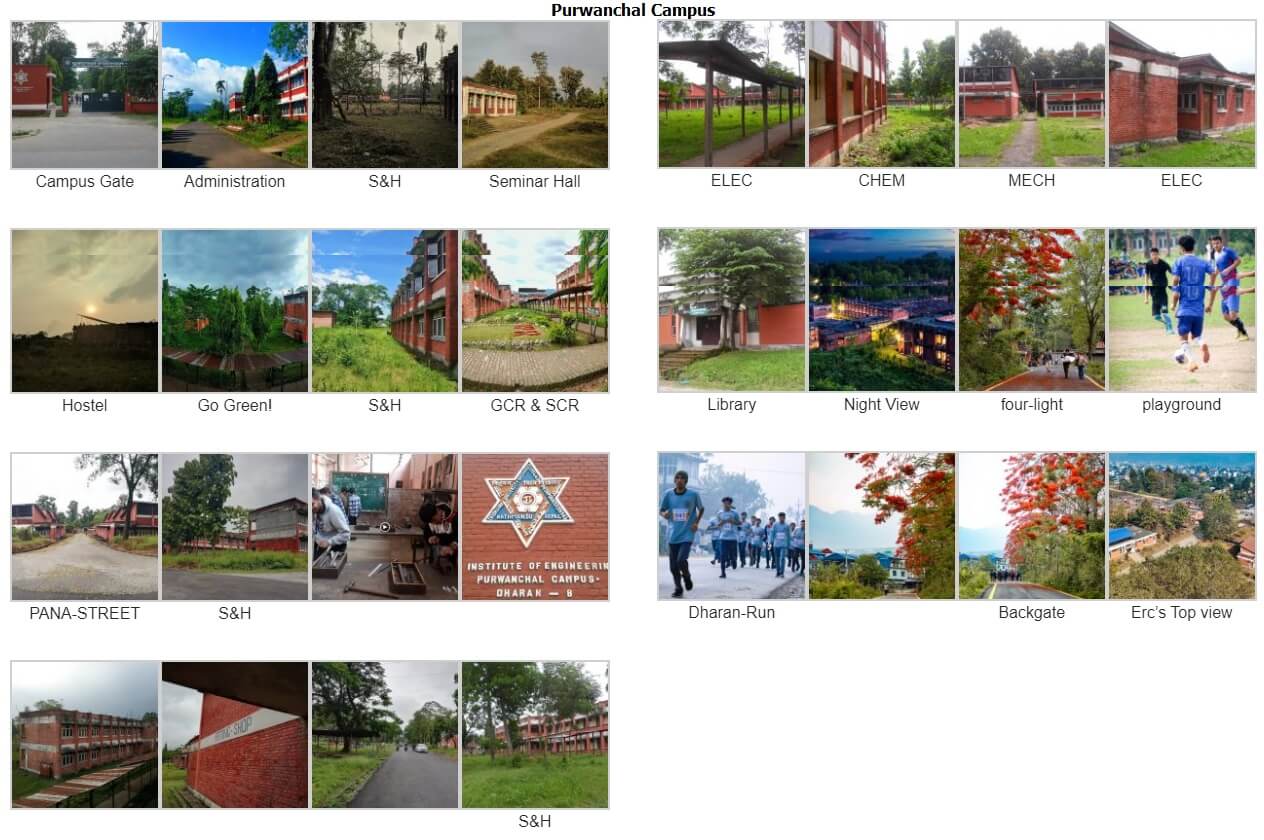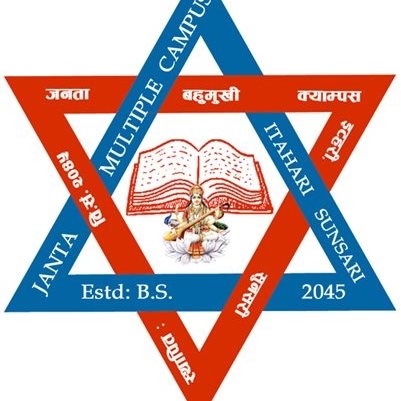Overview
Purwanchal Campus, formerly known as Eastern Region Campus (ERC), is a constituent campus of Tribhuvan University (TU) and one of the associate engineering campuses of the Institute of Engineering (IOE). As a comprehensive, non-profit making, and autonomous institution, Purwanchal Campus is a pioneering institution for higher education in Nepal. It is located in the Sunsari district of the eastern region, specifically at Gangalal Marg, Tinkune, Dharan-8.
A Legacy of Excellence:
IOE Purwanchal Campus Dharan Established in 1976 under a loan agreement with the Asian Development Bank (ADB), Purwanchal Campus received technical assistance from the government of the United Kingdom in 1978. This collaboration facilitated the Campus's development, formally organized under the Institute of Engineering (IOE), Tribhuvan University (TU), and completed construction works in 1984.
Diverse Engineering Programs:
Initially, Purwanchal Campus offered trade-level Mechanical, Electrical, and Civil engineering courses as specified in loan and project agreements. The Campus introduced Diploma programs in Mechanical, Electrical, and Civil Engineering in 1984, followed by Refrigeration & Air-conditioning Engineering in 2052 and Computer and Electronics Engineering in 2059. In 2000, the Campus pioneered the Bachelor of Engineering (BE) in Agricultural Engineering, and in 2004, the BE program in Civil Engineering commenced.
Expansion and Upgradation:
Purwanchal Campus has continually strived to expand and upgrade its programs. In 2069, it introduced programs in Electronics and communication Engineering, Mechanical Engineering, and Computer Engineering. In 2071, the Campus added the Electrical Engineering program, and in 2072, it launched the BE program in Architecture. Currently, there are seven BE engineering programs offered at the Campus.
Focus on Excellence:
Purwanchal Campus aims to achieve its development objectives and strategy by becoming a center of excellence in engineering education in the eastern region. The Campus provides state-of-the-art facilities, including classrooms, libraries, workshops, laboratories, administrative buildings, hostels for boys and girls, faculty and staff housing, and essential amenities like roads, electricity, internet connectivity, and drinking water. Equipped with modern tools, equipment, and machines, the workshops and laboratories facilitate practical learning experiences for students.
Experienced Faculty and Staff:
Purwanchal Campus boasts a dedicated team of faculty and staff. The Campus ensures a conducive learning environment with over 100 teaching faculty and 60 administrative and supportive staff members. The faculty members possess advanced qualifications and expertise in various engineering disciplines, backed by years of experience in their respective fields.
Reaching the Campus:
Purwanchal Campus is easily accessible by both road and air.
-
By Bus: The Campus is approximately a 12-hour bus ride from Kathmandu, 1 hour from Biratnagar, half an hour from Itahari, 3 hours from Bagdogra and Siliguri in India, and 1.5 hours from Jogbani, India.
-
By Air: The nearest airport is Biratnagar, a 45-minute flight from Kathmandu.
Currently, the Purwanchal Campus welcomes over 1200 students who benefit from the institution's quality engineering education and comprehensive infrastructure. With its commitment to excellence and continuous improvement, the Campus remains a trusted destination for engineering studies in Nepal's eastern region.

About Dharan:
Dharan is a beautiful and multicultural town in the eastern region of Nepal. It lies in the Sunsari District, Koshi Zone. Situated at the foot of hills, it boasts an altitude of 1148 ft (349m) and is approximately 600 km away from the capital city of Kathmandu. Dharan is renowned for its natural beauty, clean surroundings, and friendly hill people.
The town is characterized by its picturesque roads, remarkable homes, and a diverse community of different races and ethnicities. Dharan embraces cleanliness and openness, creating a welcoming atmosphere for residents and visitors alike.
One of the notable attractions near Dharan is Bhedetar, a famous hill station located 19 km north of the town. Bhedetar is a relief during the summer months when the heat becomes intense. The area offers breathtaking views of the mountains, especially during autumn when the sky is clear. Visitors can witness the majestic Makalu and enjoy the cool and fresh air. Several lodges and restaurants cater to tourists seeking relaxation and rejuvenation in this serene setting.
Another notable spot is Charle's Tower, situated atop a hill, offering an exciting vantage point. Visitors can enjoy excellent views of Hile-Dhankuta, the Kanchenjunga Himal in the north, and a vast valley with the Sapta Koshi River. Dharan's growth can be attributed to the establishment of the Gurkha Recruitment Center by the British in 1953. Rais and Limbus, ethnic groups from the eastern region of Nepal, constituted a significant portion of the Gurkha soldiers who received training in Dharan.
Dharan experiences a tropical monsoon climate, with maximum temperatures ranging from 35 to 36 degrees Celsius in April and minimum temperatures of 10 to 12 degrees Celsius in January. The town typically receives the highest rainfall, around 460mm, in August. Dharan is also known for its religious significance, with over 25 temples and holy sites, making it an important pilgrimage destination. Clear skies, particularly during autumn, offer magnificent views of the Himalayan range and allow one to enjoy the refreshing Himalayan breeze.
Historically and archaeologically important, Bijaypur Hill houses several temples, including Pindeshwar, Dantakali, Budha Subba, and Panchkanya Temples. Additionally, the nearby Barahchatra temple at Chatara is significant. Nature enthusiasts can explore the Koshi Tappu Wildlife Reserve, which serves as a sanctuary for wild buffalo and is home to more than 300 species of birds.
Dharan serves as a gateway to various hill regions in the north and east, attracting trekkers heading to destinations like Kanchenjunga, Solu Khumbu, and the Arun Valley. Although star hotels are limited, the town offers several lodges and elegant restaurants that serve delicious meals. Bhatabhateni and Gorkha Shopping Complex are popular shopping destinations.
Moreover, Dharan is recognized as an educational center in eastern Nepal, hosting prominent colleges, schools, and the renowned B.P. Koirala Institute of Health Sciences. The institute serves as a major medical institution in Nepal and provides high-quality healthcare services to eastern and northern parts of India. Other educational institutions in Dharan include the IOE/Purwanchal Campus, Central Campus of Technology (Food and Beverages Technology) in Hatisar, Mahendra Multiple Campus, and Pindeswor Bidyapitha (Sanskrit).

Objectives of Purwanchal Campus (ERC):
-
Producing skilled and qualified technical manpower: Purwanchal Campus (ERC) 's primary objective is to educate and train individuals to become skilled and qualified technical professionals. The Campus aims to meet the nation's demand for a competent workforce in various technical fields.
-
Developing nationally and internationally competent professionals: Purwanchal Campus (ERC) strives to produce professionals who are competent at the national level and capable of meeting international standards. The objective is to prepare graduates who can excel in their respective fields and contribute to the global engineering community.
-
Performing research and development: The Campus aims to actively engage in research and development activities. Purwanchal Campus (ERC) seeks to enhance the nation's engineering capabilities and address engineering problems by conducting research. These efforts contribute to advancing technology and finding innovative solutions to challenges.
Offering training and sponsored courses:
Purwanchal Campus (ERC) provides various training courses, Purwanchal Campus, formerly known as Eastern Region Campus (ERC), is a constituent campus of Tribhuvan University (TU) and one of the associate engineering campuses of the Institute of Engineering (IOE). As a comprehensive, non-profit making, and autonomous institution, Purwanchal Campus is a pioneering institution for higher education in Nepal. It is located in the Sunsari district of the eastern region, specifically at Gangalal Marg, Tinkune, Dharan-8.
A Legacy of Excellence:
Established in 1976 under a loan agreement with the Asian Development Bank (ADB), Purwanchal Campus received technical assistance from the government of the United Kingdom in 1978. This collaboration facilitated the Campus's development, formally organized under the Institute of Engineering (IOE), Tribhuvan University (TU), and completed construction works in 1984.
Diverse Engineering Programs:
Initially, Purwanchal Campus offered trade-level Mechanical, Electrical, and Civil engineering courses as specified in loan and project agreements. The Campus introduced Diploma programs in Mechanical, Electrical, and Civil Engineering in 1984, followed by Refrigeration & Air-conditioning Engineering in 2052 and Computer and Electronics Engineering in 2059. In 2000, the Campus pioneered the Bachelor of Engineering (BE) in Agricultural Engineering, and in 2004, the BE program in Civil Engineering commenced.
Expansion and Upgradation:
Purwanchal Campus has continually strived to expand and upgrade its programs. In 2069, it introduced programs in Electronics and communication Engineering, Mechanical Engineering, and Computer Engineering. In 2071, the Campus added the Electrical Engineering program, and in 2072, it launched the BE program in Architecture. Currently, there are seven BE engineering programs offered at the Campus.
Focus on Excellence:
Purwanchal Campus aims to achieve its development objectives and strategy by becoming a center of excellence in engineering education in the eastern region. The Campus provides state-of-the-art facilities, including classrooms, libraries, workshops, laboratories, administrative buildings, hostels for boys and girls, faculty and staff housing, and essential amenities like roads, electricity, internet connectivity, and drinking water. Equipped with modern tools, equipment, and machines, the workshops and laboratories facilitate practical learning experiences for students.
Experienced Faculty and Staff:
Purwanchal Campus boasts a dedicated team of faculty and staff. The Campus ensures a conducive learning environment with over 100 teaching faculty and 60 administrative and supportive staff members. The faculty members possess advanced qualifications and expertise in various engineering disciplines, backed by years of experience in their respective fields.
Reaching the Campus:
Purwanchal Campus is easily accessible by both road and air.
-
By Bus: The Campus is approximately a 12-hour bus ride from Kathmandu, 1 hour from Biratnagar, half an hour from Itahari, 3 hours from Bagdogra and Siliguri in India, and 1.5 hours from Jogbani, India.
-
By Air: The nearest airport is Biratnagar, a 45-minute flight from Kathmandu.
Purwanchal Campus welcomes over 1200 students who benefit from the institution's quality engineering education and comprehensive infrastructure. With its commitment to excellence and continuous improvement, the Campus remains a trusted destination for engineering studies in Nepal's eastern region.
About Dharan:
Dharan is a beautiful and multicultural town in the eastern region of Nepal. It lies in the Sunsari District, Koshi Zone. Situated at the foot of hills, it boasts an altitude of 1148 ft (349m) and is approximately 600 km away from the capital city of Kathmandu. Dharan is renowned for its natural beauty, clean surroundings, and friendly hill people.
The town is characterized by its picturesque roads, remarkable homes, and a diverse community of different races and ethnicities. Dharan embraces cleanliness and openness, creating a welcoming atmosphere for residents and visitors alike.
One of the notable attractions near Dharan is Bhedetar, a famous hill station located 19 km north of the town. Bhedetar is a relief during the summer months when the heat becomes intense. The area offers breathtaking views of the mountains, especially during autumn when the sky is clear. Visitors can witness the majestic Makalu and enjoy the cool and fresh air. Several lodges and restaurants cater to tourists seeking relaxation and rejuvenation in this serene setting.
Another notable spot is Charle's Tower, situated atop a hill, offering an exciting vantage point. Visitors can enjoy excellent views of Hile-Dhankuta, the Kanchenjunga Himal in the north, and a vast valley with the Sapta Koshi River. Dharan's growth can be attributed to the establishment of the Gurkha Recruitment Center by the British in 1953. Rais and Limbus, ethnic groups from the eastern region of Nepal, constituted a significant portion of the Gurkha soldiers who received training in Dharan.
Dharan experiences a tropical monsoon climate, with maximum temperatures ranging from 35 to 36 degrees Celsius in April and minimum temperatures of 10 to 12 degrees Celsius in January. The town typically receives the highest rainfall, around 460mm, in August. Dharan is also known for its religious significance, with over 25 temples and holy sites, making it an important pilgrimage destination. Clear skies, particularly during autumn, offer magnificent views of the Himalayan range and allow one to enjoy the refreshing Himalayan breeze.
Historically and archaeologically important, Bijaypur hill houses several temples, including Pindeshwar, Dantakali, Budha Subba, and Panchkanya Temples. Additionally, the nearby Barahchatra temple at Chatara is significant. Nature enthusiasts can explore the Koshi Tappu Wildlife Reserve, which serves as a sanctuary for wild buffalo and is home to more than 300 species of birds.
Dharan serves as a gateway to various hill regions in the north and east, attracting trekkers heading to destinations like Kanchenjunga, Solu Khumbu, and the Arun Valley. Although star hotels are limited, the town offers several lodges and elegant restaurants that serve delicious meals. Bhatabhateni and Gorkha Shopping Complex are popular shopping destinations.
Moreover, Dharan is recognized as an educational center in eastern Nepal, hosting prominent colleges, schools, and the renowned B.P. Koirala Institute of Health Sciences. The institute serves as a major medical institution in Nepal and provides high-quality healthcare services to eastern and northern parts of India. Other educational institutions in Dharan include the IOE/Purwanchal Campus, Central Campus of Technology (Food and Beverages Technology) in Hatisar, Mahendra Multiple Campus, and Pindeswor Bidyapitha (Sanskrit).
Objectives of Purwanchal Campus (ERC):
-
Producing skilled and qualified technical manpower: Purwanchal Campus (ERC) 's primary objective is to educate and train individuals to become skilled and qualified technical professionals. The Campus aims to meet the nation's demand for a competent workforce in various technical fields.
-
Developing nationally and internationally competent professionals: Purwanchal Campus (ERC) strives to produce professionals skilled at the national level and capable of meeting international standards. The objective is to prepare graduates who can excel in their respective fields and contribute to the global engineering community.
-
Performing research and development: The Campus aims to actively engage in research and development activities. Purwanchal Campus (ERC) seeks to enhance the nation's engineering capabilities and address engineering problems by conducting research. These efforts contribute to advancing technology and finding innovative solutions to challenges.
-
Offering training and sponsored courses: Purwanchal Campus (ERC) provides various types of training courses, sponsored programs, and workshops. These initiatives aim to enhance individuals' skills and knowledge in specific areas of engineering. The Campus supports professional development and fosters continuous learning by offering such courses.
-
Conducting problem-oriented research: Purwanchal Campus (ERC) focuses on problem-oriented research in addition to academic research. This type of research aims to address specific engineering challenges and find practical solutions. By tackling real-world problems, the Campus contributes to the overall development and progress of the engineering field.
-
Providing services to the community: Purwanchal Campus (ERC) seeks to offer services to the community, utilizing the expertise and resources available within the Campus. These services may include consultancy, technical assistance, and collaboration with industries or organizations. By extending its services, the Campus establishes strong ties with the community and contributes to its development.
-
Enhancing professional experience and retention: Purwanchal Campus (ERC) 's objectives also encompass the professional development and retention of its teaching and non-teaching staff. By providing opportunities for professional growth, the Campus aims to broaden the experience and expertise of its staff members. This objective helps create a conducive environment for continuous improvement and encourages staff retention within the Campus.
-
These objectives align with the vision of Purwanchal Campus (ERC) to utilize its resources effectively, bridge the gap between financial needs and available resources, and contribute to the technical advancement of the nation. Through education, research, and community engagement, the Campus strives to produce competent professionals and address the engineering needs of the country. sored programs and workshops. These initiatives aim to enhance individuals' skills and knowledge in specific areas of engineering. The Campus supports professional development and fosters continuous learning by offering such courses.
-
Conducting problem-oriented research: Purwanchal Campus (ERC) focuses on problem-oriented research in addition to academic research. This type of research aims to address specific engineering challenges and find practical solutions. By tackling real-world problems, the Campus contributes to the overall development and progress of the engineering field.
-
Providing services to the community: Purwanchal Campus (ERC) seeks to offer services to the community, utilizing the expertise and resources available within the Campus. These services may include consultancy, technical assistance, and collaboration with industries or organizations. By extending its services, the Campus establishes strong ties with the community and contributes to its development.
-
Enhancing professional experience and retention: Purwanchal Campus (ERC) 's objectives also encompass the professional development and retention of its teaching and non-teaching staff. By providing opportunities for professional growth, the Campus aims to broaden the experience and expertise of its staff members. This objective helps create a conducive environment for continuous improvement and encourages staff retention within the Campus.
These objectives align with Purwanchal Campus (ERC) 's vision to utilize its resources effectively, bridge the gap between financial needs and available resources, and contribute to the technical advancement of the nation. The Campus strives to produce competent professionals and address the country's engineering needs through education, research, and community engagement.
Scholarship Information:
The Purwanchal Campus (ERC) offers scholarships and full-paying seats for various programs to support students in their academic pursuits. The following table provides details on the number of scholarship seats and full-paying seats available for each program:
| Program | Scholarship Seats | Full Paying Seats | Total Seats |
|---|---|---|---|
| Bachelor in Civil Engineering | 24 | 72 | 96 |
| Bachelor in Electrical Engineering | 12 | 36 | 48 |
| Bachelor in Electronics & Comm. Eng. | 12 | 36 | 48 |
| Bachelor in Mechanical Engineering | 12 | 36 | 48 |
| Bachelor in Computer Engineering | 12 | 36 | 48 |
| BE in Agriculture Engineering | 12 | 36 | 48 |
In each program, a certain number of seats are allocated as scholarship seats, which provide deserving students with financial assistance for their studies. The remaining seats are categorized as full-paying seats, where students must pay the full tuition fees.
It is important to note that the number of scholarship and full-paying seats may vary yearly based on policies and resource availability. Therefore, interested students are advised to refer to the latest updates and guidelines provided by Purwanchal Campus (ERC) for accurate and up-to-date information regarding scholarships and admissions.
Courses Offered:
1. Bachelor of Civil Engineering (BE Civil):
This program focuses on designing, constructing, and maintaining various civil engineering structures such as buildings, roads, bridges, dams, and water supply systems. Students learn about structural analysis, geotechnical, transportation, and environmental engineering.
- Duration: 4 years
- Seats: 96
2. Bachelor of Agriculture Engineering (BE):
This program combines engineering principles with agricultural sciences to address agricultural production and resource management challenges. Students study irrigation systems, farm machinery, soil and water conservation, agricultural processing, and sustainable agriculture practices.
- Duration: 4 years
- Seats: 48
3. Bachelor of Computer Engineering (BE):
This program studies computer hardware and software and their integration to develop innovative solutions. Students learn about programming, algorithms, computer networks, database management, and software engineering. They gain skills to design and develop computer systems and applications.
- Duration: 4 years
- Seats: 96
4. Bachelor of Electronics, Communication and Information Engineering (BE):
This program explores the field of electronics, communication, and information technology. Students learn about electronic circuits, communication systems, digital signal processing, microprocessors, and telecommunication networks. They acquire skills in designing and implementing electronic and communication systems.
- Duration: 4 years
- Seats: 48
5. Bachelor of Mechanical Engineering (BE):
This program studies mechanical systems, energy conversion, and manufacturing processes. Students learn about thermodynamics, fluid mechanics, machine design, materials science, and industrial engineering. They gain skills to design, analyze, and optimize mechanical systems and processes.
- Duration: 4 years
- Seats: 96
6. Bachelor of Electrical Engineering (BE):
This program covers the study of electrical systems, power generation, transmission, and utilization. Students learn about electrical circuits, power electronics, control systems, renewable energy sources, and electrical machines. They develop skills in designing, operating, and maintaining electrical systems.
- Duration: 4 years
- Seats: 48
7. Bachelor of Architecture (B.Arch):
This program focuses on architectural design, planning, and construction. Students learn about architectural theory, building materials, structural design, environmental sustainability, and urban planning. They develop skills to design functional and aesthetically pleasing buildings and spaces.
- Duration: 5 years
- Seats: 48
8. MSc in Land and Water Engineering:
This program emphasizes land and water resources management. Students learn about hydrology, irrigation engineering, watershed management, soil conservation, and water resource planning. They gain skills to manage and optimize land and water resources for sustainable development.
- Duration: 2 years
- Seats: 20
9. MSc in Sanitation Engineering:
This program studies sanitation systems, wastewater treatment, and environmental hygiene. Students learn about sanitation planning, solid waste management, water quality management, and public health. They develop skills to design and implement sustainable sanitation solutions.
- Duration: 2 years
- Seats: Not specified
These programs provide students with comprehensive knowledge, practical skills, and hands-on experience in their respective fields, preparing them for successful careers in engineering and related industries.

Contact Purwanchal Campus, Institute of Engineering's administrative office for detailed information on the course, admissions, location, fees, scholarships, facilities, counseling or eligibility.













